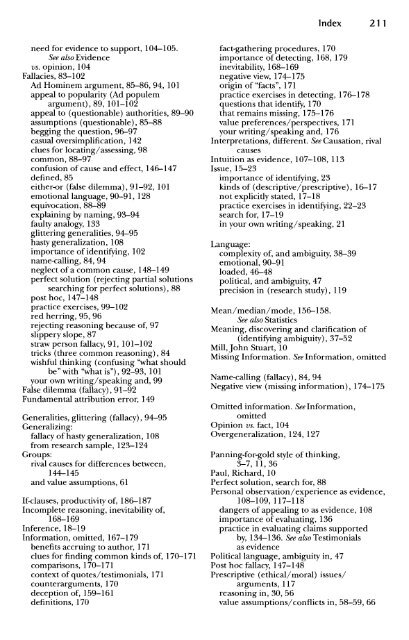Asking the Right Questions, A Guide to Critical Thinking, 8th Ed
Asking the Right Questions, A Guide to Critical Thinking, 8th Ed
Asking the Right Questions, A Guide to Critical Thinking, 8th Ed
You also want an ePaper? Increase the reach of your titles
YUMPU automatically turns print PDFs into web optimized ePapers that Google loves.
Index 211<br />
need for evidence <strong>to</strong> support, 104-105.<br />
See also Evidence<br />
vs. opinion, 104<br />
Fallacies, 83-102<br />
Ad Hominem argument, 85-86, 94, 101<br />
appeal <strong>to</strong> popularity (Ad populem<br />
argument), 89, 101-102<br />
appeal <strong>to</strong> (questionable) authorities, 89-90<br />
assumptions (questionable), 85-88<br />
begging <strong>the</strong> question, 96-97<br />
casual oversimplification, 142<br />
clues for locating/assessing, 98<br />
common, 88-97<br />
confusion of cause and effect, 146-147<br />
defined, 85<br />
ei<strong>the</strong>r-or (false dilemma), 91-92, 101<br />
emotional language, 90-91, 128<br />
equivocation, 88-89<br />
explaining by naming, 93-94<br />
faulty analogy, 133<br />
glittering generalities, 94-95<br />
hasty generalization, 108<br />
importance of identifying, 102<br />
name-calling, 84, 94<br />
neglect of a common cause, 148-149<br />
perfect solution (rejecting partial solutions<br />
searching for perfect solutions), 88<br />
post hoc, 147-148<br />
practice exercises, 99-102<br />
red herring, 95, 96<br />
rejecting reasoning because of, 97<br />
slippery slope, 87<br />
straw person fallacy, 91, 101-102<br />
tricks (three common reasoning), 84<br />
wishful thinking (confusing "what should<br />
be" with "what is"), 92-93, 101<br />
your own writing/speaking and, 99<br />
False dilemma (fallacy), 91-92<br />
Fundamental attribution error, 149<br />
Generalities, glittering (fallacy), 94-95<br />
Generalizing:<br />
fallacy of hasty generalization, 108<br />
from research sample, 123-124<br />
Groups:<br />
rival causes for differences between,<br />
144-145<br />
and value assumptions, 61<br />
If-clauses, productivity of, 186-187<br />
Incomplete reasoning, inevitability of,<br />
168-169<br />
Inference, 18-19<br />
Information, omitted, 167-179<br />
benefits accruing <strong>to</strong> author, 171<br />
clues for finding common kinds of, 170-171<br />
comparisons, 170-171<br />
context of quotes/testimonials, 171<br />
counterarguments, 170<br />
deception of, 159-161<br />
definitions, 170<br />
fact-ga<strong>the</strong>ring procedures, 170<br />
importance of detecting, 168, 179<br />
inevitability, 168-169<br />
negative view, 174-175<br />
origin of "facts", 171<br />
practice exercises in detecting, 176-178<br />
questions that identify, 170<br />
that remains missing, 175-176<br />
value preferences/perspectives, 171<br />
your writing/speaking and, 176<br />
Interpretations, different. See Causation, rival<br />
causes<br />
Intuition as evidence, 107-108, 113<br />
Issue, 15-23<br />
importance of identifying, 23<br />
kinds of (descriptive/prescriptive), 16-17<br />
not explicitly stated, 17-18<br />
practice exercises in identifying, 22-23<br />
search for, 17-19<br />
in your own writing/speaking, 21<br />
Language:<br />
complexity of, and ambiguity, 38-39<br />
emotional, 90-91<br />
loaded, 46-48<br />
political, and ambiguity, 47<br />
precision in (research study), 119<br />
Mean/median/mode, 156-158.<br />
See also Statistics<br />
Meaning, discovering and clarification of<br />
(identifying ambiguity), 37-52<br />
Mill, John Stuart, 10<br />
Missing Information. See Information, omitted<br />
Name-calling (fallacy), 84, 94<br />
Negative view (missing information), 174-175<br />
Omitted information. ^Information,<br />
omitted<br />
Opinion vs. fact, 104<br />
Overgeneralization, 124, 127<br />
Panning-for-gold style of thinking,<br />
3-7,11,36<br />
Paul, Richard, 10<br />
Perfect solution, search for, 88<br />
Personal observation/experience as evidence,<br />
108-109, 117-118<br />
dangers of appealing <strong>to</strong> as evidence, 108<br />
importance of evaluating, 136<br />
practice in evaluating claims supported<br />
by, 134—136. See also Testimonials<br />
as evidence<br />
Political language, ambiguity in, 47<br />
Post hoc fallacy, 147-148<br />
Prescriptive (ethical/moral) issues/<br />
arguments, 117<br />
reasoning in, 30, 56<br />
value assumptions/conflicts in, 58-59, 66



